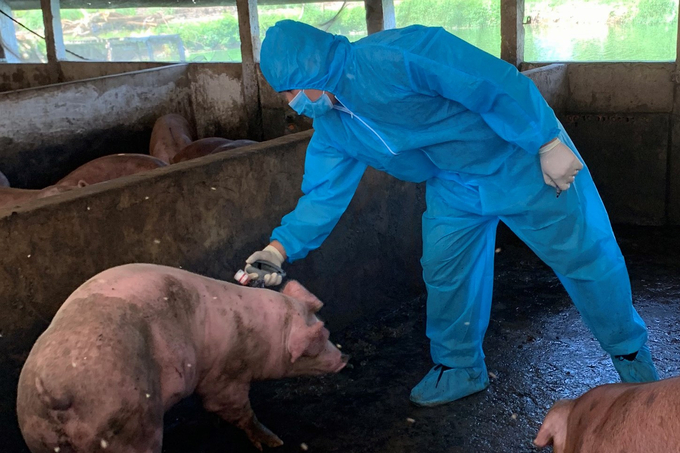May 22, 2025 | 15:23 GMT +7
May 22, 2025 | 15:23 GMT +7
Hotline: 0913.378.918
May 22, 2025 | 15:23 GMT +7
Hotline: 0913.378.918

The African swine fever in Vietnam has been gradually controlled in the first six months of 2023. Photo: Bao Thang.
According to a report made by the Department of Animal Health under the Ministry of Agriculture and Rural Development, the animal health sector at all sectors has coordinated with farmers to effectively control dangerous diseases in livestock herds, especially those in pigs within the first seven months of 2023. Most notably, the Department reported several positive changes in the state of African swine fever in Vietnam.
Namely, there were 208 reported outbreaks of African swine fever across 106 districts in 37 provinces between January 1 and July 23, 2023. The total number of pigs infected, killed, and disposed of reached nearly 8,500 heads. The total number of outbreaks decreased by 78% and the number of pigs killed decreased by 82% compared to the same period in 2022.
There are currently 44 reported outbreaks across 24 districts in 14 provinces, with an incubation period of under 21 days. Additionally, the number of infected pigs reached 2,500 heads, whereas the number of killed pigs reached nearly 2,600 heads.
This is a remarkable achievement considering that African swine fever had significant adverse effects on the livestock industry when it first emerged in early 2019.
In the same year, Vietnam reported over 8,500 African swine fever outbreaks across 63 provinces and cities, with a total of approximately 6 million pigs killed, which is equivalent to 340,000 tons. Consequently, the country suffered at least 13,200 billion VND in damages.
Subsequently, the disease was gradually controlled in the following years, with nearly 1,600 outbreaks recorded in 50 provinces and cities in 2020. The total number of killed pigs reached more than 86,000 heads, causing at least 32 billion VND in damage.
Mr. Phan Quang Minh, Deputy Director of the Department of Animal Health, attributed this achievement to Vietnam's proactive research and successful production of a vaccine against African swine fever.
The first batch of commercial vaccines developed by Navetco company was announced by the Ministry of Agriculture and Rural Development for circulation nationwide in June 2022. An additional vaccine, created by AVAC company, entered circulation by July 2023.

Mr. Phan Quang Minh, Deputy Director of the Department of Animal Health. Photo: Tung Dinh.
The Department of Animal Health is committed to closely monitoring the use of the two vaccines, NAVET-ASFVAC and AVAC ASF LIVE, against African swine fever.
According to the Department of Animal Health, more than 650,000 doses of these vaccines have been administered under controlled conditions. The vaccines are currently administered safely in over 40 provinces and cities across Vietnam according to the manufacturer's instructions. The percentage of vaccinated pigs with an antibody-producing immune response averaged over 95%.
With the aim of further enhancing the effectiveness of vaccines on small-scale farming households, the Department of Animal Health will coordinate with international experts to assist businesses in researching and producing African swine fever vaccines for other pigs such as sows and boars of varying ages. On the other hand, the Department will continue to conduct research and evaluation of vaccine use in the field.
In response to Vietnam's success in controlling African swine fever, several countries in Africa and the Philippines have contacted and ordered the ASF vaccine from Vietnamese businesses. According to Mr. Minh, Vietnam is expected to export approximately 300,000 doses of the African swine fever vaccine. The success of this shipment will allow Vietnam to reach new heights in the animal health sector.
In addition to African swine fever, other common diseases in pigs such as foot-and-mouth disease, blue ear, pasteurellosis, paratyphoid, etc., are effectively controlled thanks to preventive vaccines. Deputy Director Minh considers vaccines to be an effective "shield" against diseases for livestock.
The Department of Animal Health proposed to promote the vaccination of pigs as one of three measures to develop pig farming in a sustainable manner, in addition to controlled slaughter and animal quarantine.
On the other hand, the Department reported on the state of slaughter control activities. Accordingly, Vietnam has nearly 250 concentrated pig slaughterhouses and more than 17,600 small, individual slaughterhouses by the end of May 2023. The number of pigs subjected to controlled slaughtering at small establishments and centralized facilities is roughly equal to approximately 8.6 million heads.
Translated by Nguyen Hai Long
![Reducing emissions from rice fields: [2] Farmers’ commitment to the soil](https://t.ex-cdn.com/nongnghiepmoitruong.vn/608w/files/news/2025/05/05/dsc08881jpg-nongnghiep-140632.jpg)
(VAN) Clean rice cultivation model in Thuong Tan commune, Bac Tan Uyen district, is assisting local residents in achieving sustainable agriculture by substantially reducing costs, increasing productivity, and protecting the environment.

(VAN) At the conference to disseminate Resolution No. 68, AgriS introduced its digital agricultural ecosystem and reaffirmed its commitment to accompanying the Government in promoting private sector development and sustainable agriculture.

(VAN) 'Blue Ocean - Blue Foods' initiative is designed to restore marine ecosystems and establish sustainable livelihoods for local communities by cultivating a minimum of 1,000 hectares of cottonii seaweed in the first three years.
/2025/05/21/4642-3-112707_603.jpg)
(VAN) The V-SCOPE project has made direct contributions to three out of six pillars of the Comprehensive Strategic Partnership between Vietnam and Australia.

(VAN) Facing the threat of rabies spreading to the community, Gia Lai province urgently carries out measures to vaccinate dogs and cats on a large scale.

(VAN) Disease-free livestock farming not only protects livestock herds but also stabilizes production and livelihoods for many farmers in Tuyen Quang.

(VAN) Japan's grant aid project contributes to capacity building, promoting organic agricultural production, and fostering sustainable community development in Dong Thap province.